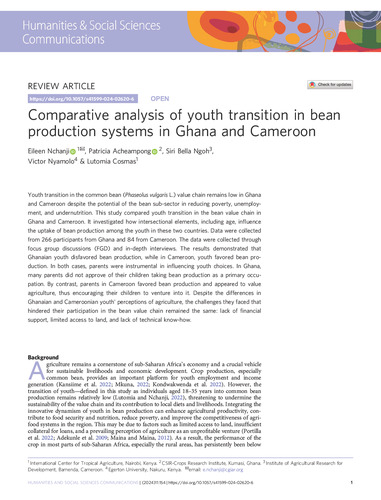Comparative analysis of youth transition in bean production systems in Ghana and Cameroon
Abstract
Youth transition in the common bean ( Phaseolus vulgaris L.) value chain remains low in Ghana and Cameroon despite the potential of the bean sub-sector in reducing poverty, unemployment, and undernutrition. This study compared youth transition in the bean value chain in Ghana and Cameroon. It investigated how intersectional elements, including age, influence the uptake of bean production among the youth in these two countries. Data were collected from 266 participants from Ghana and 84 from Cameroon. The data were collected through focus group discussions (FGD) and in-depth interviews. The results demonstrated that Ghanaian youth disfavored bean production, while in Cameroon, youth favored bean production. In both cases, parents were instrumental in influencing youth choices. In Ghana, many parents did not approve of their children taking bean production as a primary occupation. By contrast, parents in Cameroon favored bean production and appeared to value agriculture, thus encouraging their children to venture into it. Despite the differences in Ghanaian and Cameroonian youth’ perceptions of agriculture, the challenges they faced that hindered their participation in the bean value chain remained the same: lack of financial support, limited access to land, and lack of technical know-how.

